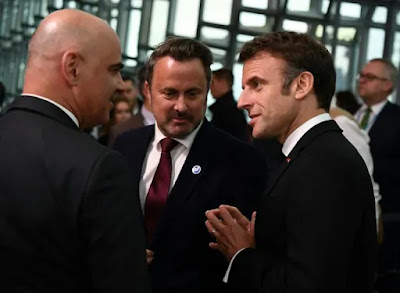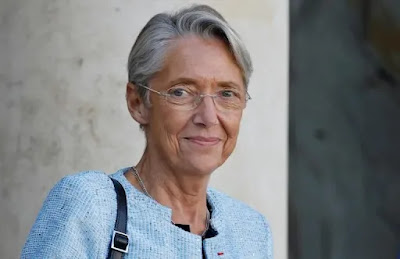Yahoo – AFP, Marc BURLEIGH, May 16, 2023

Leaders from the 46-nation Council of Europe including French President
Emmanuel Macron and German Chancellor Olaf Scholz emphasised that Moscow
would be held accountable
A summit of a rights body spanning Europe on Tuesday created a "register of damages" to record Russia's destruction of Ukraine for future compensation, and heard Ukrainian President Volodymyr Zelensky plead for Western fighter jets.
Leaders from the 46-nation Council of Europe including French President Emmanuel Macron and German Chancellor Olaf Scholz emphasised that Moscow would be held accountable for the harm and destruction it has caused in its 15-month invasion of its neighbour.
The register of damages, to be lodged in The Hague, aims to record the tangible costs Russia has exacted on Ukraine in that time.
"There will be no reliable peace without justice" and the register lays the ground for "a full-fledged compensation mechanism," Zelensky said in a video address at the start of the two-day summit.
Right now, though, Zelensky said, ballistic missile and drone attacks on his country showed "Russia is trying very hard to improve its ability to kill".
Ukraine consequently needed "additional air defence systems and missiles -- we also need more fighter jets, without which no air defence system will be perfect," he said.
The call came just after a whirlwind tour by Zelensky of major European capitals to press for Western warplanes ahead of an expected offensive against Russian positions in Ukraine in coming weeks.
He received pledges of more military deliveries from Germany, France and Britain. The latter two said they would train Ukrainian fighter pilots.
Jet 'coalition'
Western countries however are wary about supplying advanced fighter aircraft to Ukraine, fearing their use could escalate the war.
British Prime Minister Rishi Sunak and Dutch counterpart Mark Rutte agreed at the summit that they would build an "international coalition to provide Ukraine with combat air capabilities, supporting with everything from training to procuring F-16 jets," according to Sunak's office.
Other leaders in Iceland emphasised the registry of damages -- and how justified they were in kicking Russia out of the Council of Europe a year ago over its war in Ukraine.
Scholz said the registry would play "a central role" in "punishing and demanding accountability for the war crimes committed by the Russian occupiers".
Macron called on other countries to join the initiative and "actively contribute to filling it out".
The United States -- represented at the summit in an observer role -- said it too supported the creation of the register.
European Commission President Ursula von der Leyen said the register would play a role in deterring further Russian "war crimes" and called it important for the future "because only justice can be the foundation of lasting peace in Ukraine".
Britain seeks reform
All of the EU's 27 countries are part of the Council of Europe, and several of them are in favour of setting up a special tribunal to try Russia's leadership.
That would be deferred until the conclusion of the grinding war.
Russia could well be preparing its own spring attack on Ukrainian positions to try to break a battlefield stalemate.
For all the unity projected at the summit, there were fissures in the European community.
Britain is antagonistic towards the council's European Convention of Human Rights, which is a barrier to its plans to stem the irregular arrival of asylum-seekers by deporting them to Rwanda.
The convention is backed by a European Court of Human Rights which has made rulings stymying Britain's policies.
Sunak said as he arrived that he was pressing for a reform of that court as part of a strategy to stop small boats carrying refugees reaching Britain after transiting through France.
"We're going to do absolutely everything we can to do that... I'm not going to rest until we can stop the boats and that's why I'm here," Sunak said.
The leaders' gathering was also a key moment for the
heads of European heavyweights Germany, France, Italy and Britain to meet
before a G7 summit starting Friday in Japan.




















